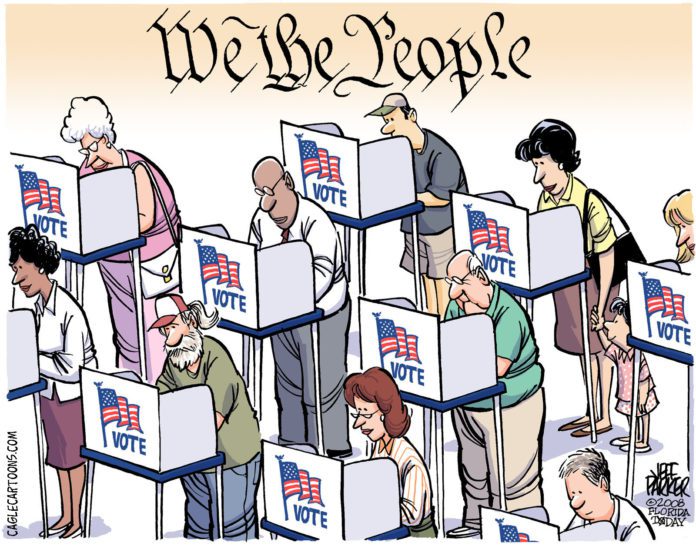BY DAVID PERRYMAN
 The year 1975 marked a number of important events. Chrysler became the first automobile manufacturer to offer rebates. Construction began on the Trans-Alaska pipeline. Bill Gates and Paul Allen form a partnership known as Microsoft. Muhammad Ali TKO’s Joe Frasier in 15 rounds in the Thrilla in Manilla.
The year 1975 marked a number of important events. Chrysler became the first automobile manufacturer to offer rebates. Construction began on the Trans-Alaska pipeline. Bill Gates and Paul Allen form a partnership known as Microsoft. Muhammad Ali TKO’s Joe Frasier in 15 rounds in the Thrilla in Manilla.
That was also the year that I was first able to register to vote … and did I ever mess up. You see, I was raised to believe that voting was an absolute civic duty and I anxiously awaited the first election in which I could cast a ballot which happened to be a school board election.
I didn’t realize the extent of my nervousness when that day arrived. I walked into the polling place and the election official tore my ballot from a pad of ballots that were consecutively numbered. In 1975, each ballot included a detachable tab on which the corresponding number was printed.
To vote the ballot, a sign instructed me to make the ballot anonymous by tearing off the tab containing the number. The sign illustrated how to place an X in the box next to my choice of candidate and how to return the folded ballot to a locked box and the detached tab to the election worker.
I received my ballot and went to the small enclosure where a pen had been left for me to vote. I had studied the candidates and was confident that there was a clear choice as to which one would be best for education. I was prepared. I looked at the ballot, took the pen in hand and placed an X … beside the wrong name!
I had no idea what my options were, but I knew that if it was possible to get a new ballot, I would have to explain what I had done. So, I folded the ballot, placed it in the ballot box, gave the numbered tab to the election worker and left the polling place hoping upon hope that the election would not be decided by one vote and that the person that I had voted for would be the loser.
My wish came true and, thankfully, I lost my first vote. Thank goodness for the secret ballot. It took several months for me to have the courage to tell anyone of my first voting experience. However, if an initiative petition that is currently being circulated in Oklahoma is successful and is approved by voters, anyone and everyone will be entitled to know how we vote.
Bryan Baxter has filed a request for approval of Initiative Petition No. 401 that he hopes will result in SQ 775 at the November 2016 general election. Mr. Baxter is seeking a constitutional amendment to require that all ballots be open and identifiable as to the name and address of the person casting them within 31 days after each election.
Now before we invoke our constitutional right to a secret ballot, we need to realize that we don’t have one. Neither the U.S. Constitution nor the Oklahoma Constitution requires that an individual voter’s choices at the ballot box be kept secret.
In fact, history buffs, secret ballots were unheard of in the United States until 23 years after the Civil War had ended. The first state to hold a secret ballot was Massachusetts and the concept did not become universal in this country until Kentucky followed suit in 1891.
Think of that. During periods of political strife in this country, citizen’s votes were public records. How comfortable was that during the formative years of this country when Whigs were battling the Party of Jefferson? Or even more testy, think of the courage it took to cast an open ballot in the South during Reconstruction.
Proponents of Oklahoma’s initiative petition argue that the secret ballot has brought about “isolation and a disenfranchised public,” according to Mr. Baxter as reported in the Tulsa World. Assuming that no protest is filed, signatures on the petition may be gathered beginning this week and that newspaper reported that 155,216 signatures would be required for the question to be placed on the ballot.
Based on a newspaper interview, Ryan Kiesel, executive director of the Oklahoma ACLU, says that making a record of how a person voted public “could create a real or perceived intimidation during elections that would either alter the turnout of the race or suppress votes altogether.”
I know that in 1975, I didn’t want anyone to know whom I had voted for and breathed a huge sigh of relief when I learned that I had not “put him over the top.”
For now, let’s keep our eyes on this initiative petition attempt as it makes its way through the system.
– David Perryman, a Chicksha Democrat, represents District 56 in the Oklahoma House of Representatives







